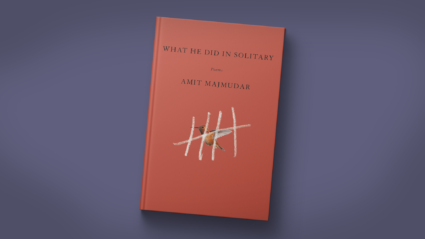
A poet and radiologist on how the pandemic has 'concentrated' his mind
Amit Majmudar likes not knowing what comes next.
When he's writing prose, when every word bears his conscious effort, "I know what I want to express." But the language and sounds in his poems can "take me to different places."
The writer's starting point for a poem could be a sound or a phrase that's lodged itself in the back of his head. There, the work in progress gathers moss — accumulating new language, new sounds. The final shape, or even the next line, is "frequently unknown to me," Majmudar told the PBS NewsHour.
"And hopefully that allows the reader, too, to kind of have an adventure with me," he said.
The a sense of discovery is embedded in Majmudar's poems — a thought or aside can take a reader down an unexpected path.
In his latest poetry collection, "What He Did in Solitary," one poem imagines the namesake of Elmer's Glue as a "taciturn farmer," prompting the reader to imagine what he looked and sounded like. (Probably a pretty quiet fellow.) On Majmudar's "Apocalypse Shopping List" is: "Wooden stakes, because you never know." Squats, shouting and sobbing — the subject of the title poem keeps his mind busy with different activities while in solitary (though the poem never specifies what kind of confinement). After the man has listed all of the American presidents, he later realizes he left one out — John Tyler — and lists them all again.
The top of Amit Majmudar's poem "Vocative" reads, "English is my native anguish." Majmudar, who grew up in both India and the U.S., said the poem is about migration, immigration and "the way we take in language, and language makes us something that we weren't from before." Video by PBS NewsHour
In another poem, Majmudar, who is also a radiologist, notes the "glossy shots" of children seen on a hospital floor. The poet rattles off the names of children — Rachel, Kasim, Hailey, Mo — "the ones who got to live."
"They never put up posters, do they, of the ones they couldn't save?" Majmudar writes.
The poem, titled "The Pediatric Cardiothoracic Surgery Floor," also takes the time to name those "whose hearts were just as 'brave.'" Naomi, Hunter, Mickey, Julie. Their names hang in the air, even if there aren't posters dedicated to them on the wall.
While Majmudar often weaves science into his poems — one poem in this latest collection is called "Virus" — he said he's not deliberately writing about anatomy or physics or radiology per se. Instead, "the sciences seem to find their way in no matter what. It's just part of who I am."
Majmudar, who was Ohio's first-ever Poet Laureate, spoke with the PBS NewsHour's Jeffrey Brown about the ways the coronavirus pandemic has shaped his writing, why he loves "nonsense," and why writing poetry has been a solitary endeavor for him.
This interview has been edited for length and clarity.
Before we talk about your book, I just want to set the time and place. How is the pandemic impacting your life and the way you live?
In some ways, it's impacting me the same way it's impacting most people. We're not traveling. We had trips planned; those trips are out. A lot of it is just staying at home every day, all day. And I'm a physician, but I'm also a radiologist. And it just so happened about two months before the pandemic hit, I'd gotten a setup in my basement where I could have the studies beamed to home. So that happened like right in the nick of time. So I've been able to work from home for a lot of these days, which has been a good thing, too.
I'm curious about the impact of the pandemic, a time like this, on your writing. And I ask that, in part, as a way into your writing, since you write about so many different subjects, from the deeply personal to the political. Does the pandemic creep in now?
It will probably later because I think, a lot of times for creative writers, there's a sort of gestation period. There's a period during which, you know — Wordsworth once said poetry is "emotion recollected in tranquility." So there has to be a time when everything sinks in, and you can kind of process the experience and then use what you've internalized, and externalize it as art.
Majmudar, a radiologist and poet, has written about viruses and pandemics before the novel coronavirus emerged. Some of these poems, he said, have a "spooky resonance" in 2020. Video by PBS NewsHour
For me, I haven't written about the pandemic as much, but what it did is, it kind of concentrated my mind. They say, having "to be hanged the next morning can concentrate your mind remarkably." And I think that the pandemic really reminded me of my own mortality. It reminded me that I have so many books I want to read and so many books I want to write, and I only have so much time. So I actually had become more productive during the pandemic. And there are projects that I've been delaying that I've suddenly been like, "I'm not going to delay this anymore. I'm going to jump into it." So I've actually written a lot during the pandemic. I can't assume that I'm going to be healthy and long-lived, and that's always been something that I've taken for granted. I know better, I know anything can happen to anyone. But the pandemic really, really brought it home to me that this is it. This is my chance. And I need to use the time I have as well as I can.
How do you process experience in your poetry? Is it notetaking? Is it just letting it sit there in your head and come back to it much later? How does it work?
In my particular process, a lot of what I do is spontaneous and serendipitous. And I'm always scanning the language. And a lot of my poems rely on sound. Part of my compositional process is not trying to push from behind, but having the language lead me. And so, one word can lead or suggest another word, and I surrender myself to that a lot. But because there's frequently some element of narrative, some element of emotion that you're always expressing that kind of triggers the poem simultaneously, I found that a lot of times, me playing around with words will sort of snatch memories that I wasn't even thinking about, snatch anecdotes, snatch feelings that I felt back when I was 19 or 20. And just, like, bring it into the poem. It's almost as though the phonetics part of my brain reached into my memory and brought something out. And so it's not as conscious. I don't take notes very much. I do occasionally text myself a note. But that note will usually be some nonsense rhyme or simply a word or a phrase that appealed to me on its phonetic grounds.
You just used that word "nonsense." I can see that you're playing often with the words. And, on the one hand, it's almost creating a kind of nonsense. But, as you say, it makes its way somehow to a different kind of sense, if that's a fair way of putting it.
That's absolutely true. And that's part of the poetic compositional process, because poetry is like one aspect of what I do. I've written novels and essays and a lot of prose. And I want poetry to be a different experience for me compositionally. And so, when I'm writing prose, I am sort of very consciously shaping the material. I know where I'm going. I know what I want to express. With poetry, there is an element of that — I'm not going to say that I enter the poem with a completely empty mind and no notion of what I'm doing or what I intend to do — but that conscious or willed element is way secondary compared to the aesthetic and phonetic aspects that I'm bringing in, I'm working with, and I'm shaping. And so, with a poem, the final shape and the final sequence of words are frequently unknown to me at the beginning. Even the next line is frequently unknown to me — and I like that. I like that not knowing. And I like the way in which the language itself and the sounds in the language take me to different places that I don't know. And hopefully that allows the reader, too, to kind of have an adventure with me, because I guarantee you, most of the time I didn't know where I was going with it.
Can you give me an example? A few lines from a poem?
Yeah! Sure. I think one of the more phonetic poems that I have in here is called "Vocative." Appropriately enough, it's about language. The initial intention was to write about English being my native language, even though I had a really strong cultural connection to my Hindu faith, to the Indian subcontinent. I grew up speaking Gujarati in the household with my mother. So it's a native language, but it's not my mother tongue because this is not the tongue I speak with my mother. And so, really, there's a tension there. So the first lines of "Vocative" are derived from that intention, which is to write about– English is my native language. But in that sort of spirit of play, the poem actually begins like this:
English is my native
anguish. I was born here,
read here, teased and torn here.
Vocative, ablative,
locative, alive:
English was a dislocation
navigating oceans.
But sometimes you do take a more direct approach to what we could call a subject matter, whether it is being the child of immigrants or the work you do as a doctor or even sex — very direct world experiences. In those cases, does the subject come first?
Yeah, I think so. And the other thing that you'll notice about my poems, in this book and all the books before it, is that I'm always doing something different from poem to poem. And part of that is because I don't have a single compositional technique. And every time I tell you that I do it one way, there are at least a dozen examples of me doing it some other way. And so you bring up a good point, which is that the way that "Vocative" was composed is, for example, not the way that "Letters to Myself in My Next Incarnation" was composed, because that was very much an idea, a theme, which I then riffed on. So, yeah, I have a lot of techniques, lot of tools in the tool belt. And I think that as long as you can get results, I enjoy just the process one way or the other.
I'm glad you brought up "Letters." That poem sort of comes in the middle and has a sense of a spine in a way. How did you think of it for this book?
That's definitely how I conceived of it. I wanted it to be centered in the book, and I wanted it to be the "spine" of the book in the sense that it has nerves that go out to all the extremities from the front to the end. And that poem dovetails with the notion of selfhood and who you are. And the Hindu or Vedanta notion that we're actually many different selves stretched out or distributed across all our different births and rebirths, which I've always found to be a very beautiful idea, a very mystical and mysterious idea. And so, this sequence was born of meditating on that particular idea, and it was born from the idea of wondering who I would be in my next incarnation and whether I would love the same woman that I love in this incarnation. Would I be able to find that person?
What about the work as a radiologist? Do you keep these things separate in your head?
I've always thought to myself that I do keep it separate in my head. But the truth of the matter is, when I look at my own work, I don't.
You're not aware of it until you look at the work.
I'm not because it's like in the groundwater at this point. And the only formal education that I've had is in the sciences. I never really took very much in the way of literature classes or anything like that. I'm just self-taught. I read a ton, but nothing really in a formal setting. And so having studied all of that, so in-depth to become a radiologist, and you have all those years of radiology and physics and everything like that, it's just the groundwater of my brain now. And so I refer to anatomy, I refer to physics, and I don't even process it as being something radiology-related. It's just me-related at this point. I rarely write directly about radiology. But yet the sciences seem to find their way in no matter what. It's just part of who I am.
You do write sometimes about specifically about being the child of immigrants, about looking a little different in America today and having to deal with that. In this book, there's a poem called "Grooming."
I, myself, have noticed for years that people treat me different, depending on what my facial hair is like. There's small things as far as when you're stepping into an elevator, whether people make eye contact and smile at you or whether they don't. And then, obviously, airport screening, things like that. There's a different way in which people regard you. And "Grooming" is a really short poem. It kind of deals with the many different "me's" that I have been, depending on whether I shaved recently or not:
I shaved my face, and they called me doctor.
I showed up scruffy the next day, and they called me terrorist.
I grew out my beard, and they called me maharishi.
I left a goatee, and they called me Rushdie.
I cleaned it up into a mustache, and they called me fresh off the boat.
I got rid of the mustache, and they called me doctor again.
So tell me, I said, what brings you in today?
What is bothering you?
What keeps you up at night?
So I take the question that is typically asked to patients and it's redirected to the reader and redirected the people who are calling me all these different things based on some trivial, superficial characteristics.
What about the title poem, "What He Did in Solitary"? It's clearly tied to solitary confinement. But is it to be taken literally or is it thinking about yourself in solitary?
That poem ends the book. It was written before the pandemic, but it ended up having unexpected resonance during the time of the pandemic, the time of quarantine. And that was unintentional. The poem had been written long before any of that happened. The way I looked at it, is primarily, as metaphorical. There's solitary confinement of a prisoner in a prison. And I used that as a metaphor for embodiment itself. So the soul is solitarily confined in the body, because in a lot of religious traditions the soul is almost, quote unquote, a prisoner in the body. And then there's also the way in which it dovetails with isolation, a sense of isolation, a sense of loneliness, a sense of being not one of a crowd and not among the crowd, which is something that I think a lot of poets might be able to relate to. For me, poetry writing has always been a very solitary endeavor. And I was in my 30s before I ever actually met another poet. And I still don't regularly correspond or converse with any other poets. As far as regular poetry friends, I don't have anybody. And so it is a very solitary thing for me. And I don't mind that, but it is something that informs the poem.
READ MORE: Why poems can be safe spaces during the pandemic
Support Canvas
Sustain our coverage of culture, arts and literature.













